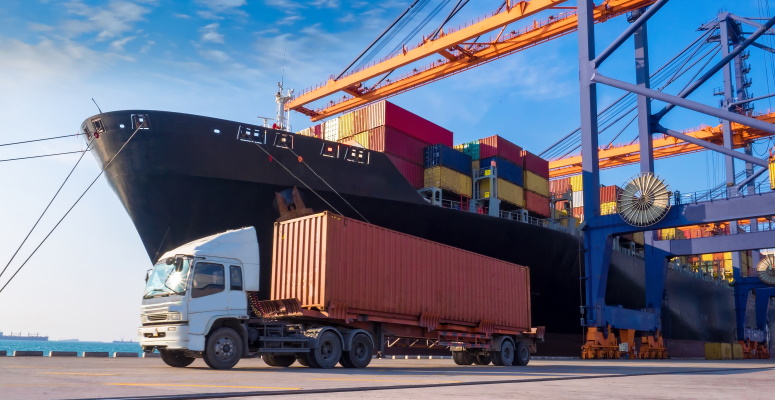
Month in Review – February 2024
Maritime
February 1: Strikes at DPW Ports Across Australia Exacerbating Empty Box Shortage – The Loadstar
Dock worker strikes across Australian ports operated by DP World are amplifying the Red Sea crisis equipment crunch being felt largely in Asia.
Following shipping delays caused by diversions from the Red Sea, empty-container shortages have been reported on high-yielding trades from Asia.
Peter Sundara Swamickannu, head of global ocean freight product at Visy Global Logistics, said: “I think equipment shortage is hitting many of us… Especially in China, we require these containers, but most of the surplus is in Europe.
Dock workers throughout Australia have been striking since October in a pay dispute against port operator DP World, which estimated the cost to the Australian economy at A$86m ($56m) a week.
The Maritime Union of Australia has extended its strike action to February 10.
February 2: Dock Workers Down Under End Strike at DP World – The Loadstar
Australian shipping stakeholders have cause to celebrate as DP World and the Maritime Union of Australia (MUA) have reached an agreement that will end protected industrial action at Australian ports.
Dock workers throughout Australia have been striking since October in a pay dispute against port operator DP World, which it is estimated has cost the Australian economy A$86m (US$56m) a week.
February 6: Ocean Freight Industry Lagging in Digitization, Report Finds – Inside Logistics
A new study has found that 40 percent of ocean freight carriers are not using digital solutions to expedite operations. The report, based on a large-scale survey conducted by ODeX, provides in-depth insights into the operational challenges, adoption of digital documentation and the evolving landscape of maritime logistics.
The survey, which garnered responses from a diverse group of industry professionals, revealed the following findings.
Three quarters of respondents experience operational bottlenecks frequently or occasionally, with 50 percent citing documentation issues as a major challenge. The most common issues included delays, errors and difficulties in obtaining originals. Approximately 30 percent cited logistical challenges such as blank sailings and roll overs as significant bottlenecks. Around 20 percent of participants pointed out delays and complexities related to customs and regulatory compliance.
February 7: Revised Carrier Schedules Bedding-in, Say Shippers, But They See Trouble Ahead – The Loadstar
Amid continuing attacks on commercial shipping by Houthi rebels, scheduling issues caused by re-routing of services away from the Suez Canal and around the Cape of Good Hope (CGH) have begun to stabilize.
Director of Global Shippers Forum James Hookham said: “There was a bit of a lull in ports while the diversions were in place, so there were a lot of ships that didn’t turn up when they were expected to, but they are on their way and they’re starting to arrive.
“We should see stability in schedules and arrivals now – albeit it will take longer for goods to get here – but they should bed down into the new arrangements and start to get back to the regular pattern shippers are expecting.”
February 12: First Rays of Optimism Are Shining on South Africa’s Struggling Ports – The Loadstar
From Durban’s shoreline, the immediate horizon of the Indian Ocean is still decorated with freight vessels on anchorage, waiting for berthing slots in South Africa’s largest port, a legacy of several months’ of port congestion. Although it was hoped the backlog could be cleared by late January, industry experts now say the whole of February is needed to clear the congestion at the country’s eight main ports that has seen shipping rates soar and some major lines pare down port calls.
But in a sector beleaguered by over a decade of difficulties, including neglected infrastructure, aging equipment and a stagnated economy, that maritime horizon looks set to start clearing metaphorically as well as literally, with local industry favourite Michelle Phillips taking the helm as the acting CEO of Transnet National Ports Authority.
“We’ve seen some really good moves from Transnet in recent months, especially with changes to the executive board, which have helped a lot,” said Jacob van Rensburg, R&D head of the South African Association of Freight Forwarders. “It’s very promising and good things are starting to happen, but this is against a backdrop of 10 to 15 years of stagnation, so a lot of hard work is taking place behind the scenes.”
February 15: Ocean Carriers Propose “Feebate” Carbon Levy – The Maritime Executive
The World Shipping Council, the industry body for ocean carriers, has joined the call for a “feebate” bunker tax-and-subsidy program – but with a new twist.
The idea of the “feebate” is straightforward: Fossil bunker consumers pay a levy, and the proceeds are used to subsidize the price of expensive green fuels. This makes green fuels more competitive on the market and paves the way for broader commercial adoption.
The International Chamber of Shipping has proposed what may be the best-known feebate structure. ICS’ levy would start at an initial $20-$40, and would remain at that level until IMO member states vote to raise it, without an automatic mechanism to increase fees over time.
WSC’s bunker levy would start at a comparable level, but would increase automatically to match the expansion of the green-fueled fleet.
February 21: Carriers Still Desperate for Capacity to Guarantee Emergency Schedules – The Loadstar
Ocean carriers are struggling to maintain weekly sailings from Asia to Europe via the Cape of Good Hope routing, despite the delivery of some 425,000 TEU of newbuild capacity this year.
According to an analysis by Alphaliner, the extended voyages are proving a challenge for carriers endeavouring to keep to revised proforma schedules.
“At least two, and preferably three, extra vessels need to be added to each loop to guarantee all scheduled departures,” said the consultant.
However, to plug the gaps in their networks, carriers have adopted a hybrid strategy of adding some extra vessels and speeding-up ships, supplemented by additional sailings with any size ship they can fix on the charter market.
February 23: Carriers Face Chilly Response to Their New Transpacific Contract Rates – The Loadstar
Transpacific container spot rates remain high as the contracting season moves into gear; however, new contract proposals from carriers may get the cold shoulder.
Xeneta’s XSI Asia-U.S. west coast component ticked up 1% last week, to an average of $4,762 per 40ft, which compares with the reading for the same week of last year of just $1,329 per 40ft.
Meanwhile, reversing consecutive weeks of decline, the Freightos Baltic Index (FBX) Asia to U.S. east coast average spot rate increased 3% last week, to an average of $6,764 per 40ft, more than double the spot rate a year ago.
With ocean carriers, BCOs, shippers and freight forwarders assembling in their hundreds for the JoC TPM conference in Long Beach in a week’s time – the traditional start of the transpacific contract season – the lines will believe they are in the perfect position to push for substantial contract rate hikes.
However, anecdotal reports suggest carrier account negotiators at TPM24, endeavouring to persuade customers to sign up for long-term deals, will be in for a challenging few days across the meeting rooms and halls of the Long Beach convention centre.
February 23: U.S. FMC Releases Final Rule on Detention and Demurrage – Supply Chain Dive
The U.S. Federal Maritime Commission released a new rule on detention and demurrage billing practices as part of its compliance with the Ocean Shipping Reform Act of 2022.
Detention and demurrage billing practices were major problems for shippers during the pandemic. Ocean carriers collected about $6.9 billion in detention and demurrage costs from 2020 to 2022, according to the FMC’s final rule shared on February 23.
Air
February 5: January Pushes Air Cargo Volumes Up 10% as Red Sea Conflict and Lunar New Year Combine – American Journal of Transportation
Global air cargo volumes rose by 10% year on year in January as shippers’ concerns over hostilities in the Red Sea and an early Lunar New Year more than compensated for an anticipated post-Christmas drop in ecommerce traffic, according to the latest weekly market analysis by Xeneta.
With plenty of available air cargo capacity in what is traditionally a quieter month for demand, however, fuller cargo holds are yet to translate into higher rates. Globally, general air cargo spot rates in January declined 12% month on month, to an average US$2.27 per kg, consistent with the trend of the global dynamic load factor, which dropped three percentage points to 56% versus December. Xeneta’s dynamic load factor analysis measures air cargo capacity utilization by considering both cargo volume and weight perspectives of cargo flown and capacity available.
Overall, the year-on-year growth of global air cargo market supply slowed down in January, as much of the missing capacity was restored last year.
February 21: Shein, Temu and Other E-Commerce Retailers Are Upending Global Air Cargo Industry – CBC News
The rapid rise of fast-fashion e-commerce retailers such as Shein and Temu is upending the global air cargo industry, as they increasingly vie for limited air-cargo space to woo consumers with rapid delivery times, industry sources say.
Shein, PDD Group’s Temu and ByteDance’s TikTok Shop, which recently launched online shopping in the U.S., ship the majority of their products directly from factories in China to shoppers by air in individually addressed packages.
Shein and Temu together send almost 600,000 packages to the United States every day, according to a June 2023 report by the U.S. Congress, and their growing popularity is boosting air-freight costs from Asian hubs like Guangzhou and Hong Kong, making off-peak seasons almost disappear and causing capacity shortages, the sources said.
According to data aggregated by Cargo Facts Consulting, Temu ships around 4,000 tonnes a day, Shein 5,000 tonnes, Alibaba.com 1,000 tonnes and TikTok 800 tonnes. That equates to around 108 Boeing 777 freighters a day, the consultancy said.
Rail
February 20: Canada’s Two Major Railways Could See Strike in May: Teamsters – Today’s Trucking
Tensions between the Teamsters Canada Rail Conference (TCRC) union and railways Canadian National and Canadian Pacific Kansas City (CPKC) are ramping up after the December 31, 2023 expiration of three major collective agreements.
About 9,300 workers at the railways are covered by the agreements.
Negotiations have come to a standstill and CN and CPKC have filed notice of disputes with the federal government, requesting government mediators be appointed. Teamsters points out the notice of dispute starts the legal countdown to a possible strike or lockout, which could come as soon as 81 days after government mediators are appointed. This could lead to a labour disruption as early as May.
Trucking
February 2: International Student Cap to Squeeze Driving School Enrolment – Today’s Trucking
The federal government on January 22 capped the number of international student permits over the next two years. It will approve approximately 360,000 undergraduate study permits for 2024, a 35% reduction from 2023.
Each province and territory will get permits according to population, and Ontario is likely to see a 50% cut from present numbers.
“Driving schools in Brampton are fed by international students,” said Manan Gupta, regulated Canadian immigration consultant and president of Skylake Immigration based in the city. “Their intake is going to suffer.”
Raj Walia, owner of Trukademy based in Mississauga, Ont., said international students form a large part of trainees at truck driving schools in the area. He added there are schools in Brampton whose trainee intake is 60% to 70% international students, and they will be affected. “It will impact the training business and the overall trucking industry down the road,” he said.
February 2: Lower Mainland Authorities Placed 58% of Inspected Trucks Out of Service in 2023 – Today’s Trucking
Burnaby RCMP’s Traffic Services and 10 partner agencies placed 58% of the commercial vehicles they inspected out of service (OOS) during enforcement operations across the Lower Mainland in British Columbia last year.
Authorities conducted 50 operations in 2023, inspecting 1,715 trucks and placing 999 OOS, according to a news release. The RCMP said there were 3,974 violations recorded and 1,298 tickets issued.
“Though the percentage of trucks placed out of service has inched down slightly this past year, there is still a lot of room for road safety improvement,” Corporal Mike Kalanj with the Burnaby RCMP said in the release.
CIFFA Advocacy, Communications, Activities
February 1: CIFFA Selects 2024 Canadian Young Logistics Professionals Award Winner – The Forwarder Blog
Every year, CIFFA offers an award to a young freight forwarder who best demonstrates industry knowledge and skills to become a true international freight forwarding professional in the future.
After a review process of industry experience and a written dissertation demonstrating technical knowledge, CIFFA is pleased to announce that Rashaad Francisco D’Gama Rose of DSV Global Transport and Logistics has been selected as the 2024 Canadian Young Logistics Professionals Award winner.
CIFFA would like to acknowledge the good efforts and exceptional work of the Young Logistics Professionals Award competition runner up, Dhiraj Kochar.
February 9: CIFFA Submission: Supply Chain Regulatory Review
On January 26, CIFFA sent a submission to the Treasury Board Secretariat for its pending Supply Chain Regulatory Review. The review, “Let’s Talk Federal Regulations,” will examine federal regulations and practices, with the goal of supporting supply chain efficiency and resilience.
Following the review, the Government of Canada will develop a Regulatory Roadmap, outlining initiatives to improve the federal regulatory framework to better support economic growth and innovation.
Submissions were due by February 5. CIFFA commented on the issues of Duplication of Reporting Requirements and Weakness of Canadian Competition Legislation.
February 26: CIFFA’s Pre-Budget Submission
CIFFA has submitted, to Deputy Prime Minister Chrystia Freeland, a pre-budget document outlining our key priorities for the upcoming federal budget.
As we approach the next federal budget, our industry is experiencing reduced volumes of freight, owing to a decline in consumer demand due to inflation. The very severe human resource problems that afflicted the shipping sector following the COVID pandemic have somewhat declined, as a result. We see rising investor caution across our sector.
We have often stated that Canada’s supply chains are fragile at best, and frequently nearly broken. There has been ample evidence to support this over the last several years as environmental disasters, a pandemic, labour issues and infrastructure woes, not to mention geopolitical factors, contributed to that fragility.
But as the concept of a fluid supply chain becomes more recognized and championed for its contribution to our country’s GDP, productivity and reputation as a trading nation, we are hopeful that things will improve over the long term for Canadian consumers and businesses.
The Supply Chain Office created by this government is a good indicator that the role of a strong supply chain is supported.
We cannot ignore the weak spots, including the current labour environment, continued climate shocks and an economy with tightened monetary controls. And so we await with great anticipation a budget that recognizes these constraints and addresses concrete solutions.



